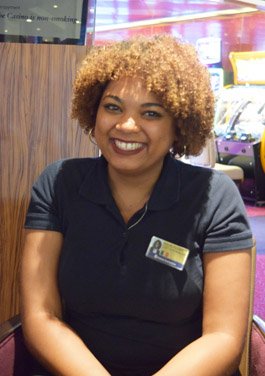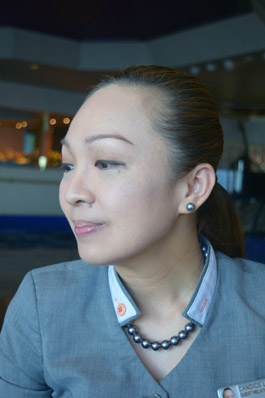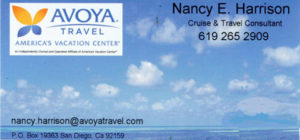Editor’s Note: This is the 40th in a series of stories researched during Don and Nancy Harrison’s 50th Wedding Anniversary cruise from Sydney, Australia, to San Diego. Previous installments of the series, which runs every Thursday, may be found by tapping the number of the installment:1, 2,3,4, 5, 6, 7,8, 9, 10, 11, 12,13, 14,15, 16, 17, 18,19,20, 21, 22, 23, 24, 25, 26, 27, 28, 29, 30, 31, 32, 33, 34, 35, 36, 37, 38, 39
By Donald H. Harrison

AT SEA, Aboard MS Maasdam – Not every crew member shares a cabin with upper and lower bunks. Some, after working their way up through the cruise ship’s ranks, get cabins of their own. In some of them, there still are bunk beds, but at least there is privacy. On larger ships, some crew cabins have twin beds that can be moved together to make a queen-sized bed.
Candice Lising, guest relations supervisor aboard the Maasdam, and Kate Flore, assistant manager of the Maasdam’s shops, both enjoy single accommodations. Lising works directly for Holland America Line, whereas Flore works for a Miami-based concessionaire, Starboard Cruise Services.
Although Lising’s family name is Filipino, she has a Chinese name as well. Her parents decided to give Lising a Filipino name, rather than a Chinese one, to better assure her integration at school with other classmates. Lising said her parents didn’t want teachers to stumble over the pronunciation of her name, and thus, perhaps, draw unwelcome attention.
Flore, who was born on French-speaking Reunion island and later moved to Mauritius, said she has always wanted to go to sea. “I was eight years old and I saw my first cruise ship, and I told my mom, “I am going to be on a cruise ship when I am older.’ And she said, ‘You are crazy, no, no, no,’ but at 21, I was on a cruise ship living my dream, you know. You are independent, and you are discovering the world, and you are traveling without paying anything, and they are paying you to work.”


Lising completed a bachelor’s degree in commerce and finance, and then enrolled in nursing school, switching to and completing the curriculum for occupational therapists. But she decided that was not what she wanted to do either, so at the University of Santo Tomas, a Catholic University in the heart of Manila, she took graduate courses in management. She defrayed expenses by working as an administrative assistant at the Asian Institute School of Management. “I helped the professors with their curricula, their materials, and in between I could get a few courses,” she recalled. “I was only taking 10 units, which is minimal, and a friend suggested that I take a gap year and apply for a cruise ship position.”
Fluent in Chinese, Tagalog (Filipino), Spanish, and English, Lising was hired 10 years ago by Holland America to serve as an international concierge. This was a position in the “back office, handling money exchange, literature translations, answering phones, folding papers, and hosting social events,” she said. The Spanish-speaking guests were her special responsibility on the world cruise aboard MS Amsterdam.
“The travel was so rewarding,” she said. “I felt that I needed to travel more and take more contracts.”
Flore joined the concession company as a shop assistant. Initially, she worked in the shops on rival Royal Caribbean Cruise Line ships, but subsequently was transferred to Holland America Line.
On her first contract, she said, she learned to “never judge people by the countries that they come from” and that customs, even in something so universal as how people shop, vary from culture to culture. While, of course, there are exceptions to every example, she said, she found that passengers from Latino backgrounds would check out almost every sale promotion. Anglo-Americans would come to some promotions, but not others. To Asian shoppers, “you don’t need to explain anything. If they want it, they want it. They say, ‘I am going for it; just give me the price.’”
Flore also learned that unlike her countrymen in Mauritius and Reunion, where “we are all the same, we are all Black,” conversations at the cosmetic counter about skin color products, can be dicey. “When you are on a ship, you need to think twice,” she said. “Simple things can be a drama. You listen first, and then you talk.”
 Lising extended the time between her contracts so that she could successfully pursue a master’s degree in international studies. “The good thing about Holland America was that they knew my situation and that I was trying to finish school, so I was able to take breaks of six months to a year to take classes,” she said. She received her master’s degree in 2015, and secured a faculty position on teaching about international travel. “I taught safety at sea, introduction to cruise lines, and transportation management,” she said. “Some professors actually took my course, because I was considered something of an expert in the subject matter, if only because I had actual at-sea experience.”
Lising extended the time between her contracts so that she could successfully pursue a master’s degree in international studies. “The good thing about Holland America was that they knew my situation and that I was trying to finish school, so I was able to take breaks of six months to a year to take classes,” she said. She received her master’s degree in 2015, and secured a faculty position on teaching about international travel. “I taught safety at sea, introduction to cruise lines, and transportation management,” she said. “Some professors actually took my course, because I was considered something of an expert in the subject matter, if only because I had actual at-sea experience.”
When Lising returned to the cruise line, she was given a position as lead concierge, a step up the ladder. Later still, she was named guest relations supervisor, in which she supervises the day-to-day operations of the guest relations staff. The people at the front desk of the cruise ship report to her.
“It is like regular hotel work, only there is also the added administrative side as we go from port to port, dealing with ship clearances and these kinds of things,” she explained. “One of the courses I teach is transportation management, which talks about logistics, disembarkation preparations, when you should let passengers off an aircraft or ship. We deal with the logistics of gangway placement, how many stevedores will be involved, and how many we will need clearances for. So for example, when this ship came to Hawaii, where it was cleared by U.S. authorities, that “required a lot of conference calls back and forth between the ground staff and the ship staff.” For ships that are on a regular schedule, like those calling week after week at the same ports on 7-day itineraries, this is a routine matter, but procedures are far more complicated on long repositioning cruises, such as our 39-day journey from Sydney, Australia, to San Diego, USA.
The second step up the ladder for Flore was as a specialist in watch sales, during which she was trained on board by a district manager of Starboard Cruise Services. Later still, she was promoted to assistant manager of the several shops aboard, which carry not only jewelry, but such merchandise as clothing and logo items, cigarettes and liquor.
“When I was the staff, all I had to do was sell and keep the shop clean,” Flore said. “When you are assistant manager you have to deal with everything actually; why some things are selling, others aren’t; doing inventory; what kind of themes we should have, and also we have to deal with the personnel issues.”
She said there is a staff of nine people covering the shops, supplemented by people who mount a “trunk show,” meaning that they sell their independent company’s goods for the duration of that cruise only, and then move on to another cruise ship. On our cruise, a company selling Australian opals was aboard. “The two staffs work together,” said Flore. “We promote them, they promote us.”
Her staff holds a “kick off meeting in the morning” to discuss goals and to build the team. “Every day we have a key word of the day,” Flore said. “Today it is ‘communication.’” The staff also discusses promotions to draw passengers to the shops. For example, “we did a fashion show for Valentine’s Day, and we had a pop-the-balloon party.” They also conducted regular drawings for prizes.
Buying patterns are different on long cruises than they are on short 7-day cruises. During the short cruises, items sell quickly, and so the shops can be crowded. Passengers on long cruises can afford to take a more leisurely approach. Yes, they want to buy something, but what is the hurry? There’s plenty of time before disembarkation. Accordingly, Flore commented, “you just have to be patient. You know by the end of the cruise they will come to shop.”
Team-building is also an important component of the guest services department, said Lising. Her staff are the people passengers come to if there are problems or special requests. Although I use the term “passengers” here, that term is never used by Lising and her staff. “Guests” is the preferred usage. She explains, “A passenger is someone akin to a person sitting on an aircraft that you have for four- to twelve-hour flights. But a guest is someone whom you welcome to your home. And this is my home, really, I have been aboard the Maasdam four times, more than any other ship. Each time I was here for six months.”
There are 13 people dividing work in the front office over various shifts. On a regular basis, said Lising, “we have ‘best practice’ management sharing time discussing what we did. This is a very young team. I have four people completing their first contracts, all with very good potential. Staff members are from the Netherlands, Belgium, and the others are Filipinos.
Lising said that European staff members tend to be straightforward in announcing their expectations of the job. “They will tell you exactly what they think and want,” she said. “The Filipinos on the other hand tend to be more relaxed, as if to say, ‘I am here, I know I will be good.’ … Our office is an English-only zone, but sometimes we slip. We need a reminder because we have a tendency to revert back to our vernacular.” She encourages such staff interactions as “chit-chat, which is good for a happy back office, which translates to a happy front office, and then to happy guests.”
She added, “I want a welcoming front office. If you can help the guests or not, a smile goes a long way. For example, if I go to a hotel and people make eye contract and smile, I am sold already. Half the problem has been solved – you are here, I am here, and the rest we can figure out. So regardless of whether they are new or on their way to a promotion, this is the basic human psychology of being there for others.”
Asked about their hobbies and anticipated futures, Flore said that she used to sing with a band on Mauritius and also enjoyed playing rugby I asked her opinion of New Zealand’s famed rugby team, “the All-Blacks” and the haka (war dance) that team performs prior to each game. “Oh my God,” she responded enthusiastically, “they are the best. They were first ones to make rugby international.” And if they performed the haka just before opposing her team? “I think I would be scared,” she laughed. “I would say I am going to come back, but first give me two shots of tequila!”
As for her future, she said, “I will leave the ship when I find the right person, and the decision will be made. When my prince comes along on his jet skis!”
Lising intends to return home and to achieve a tenured position at the University of the Philippines. “I’ve been married for six years now,” she said, “and I’d like to retire early so that we can still enjoy life and travel for leisure—as guests.”
Her husband, who sells commercial real estate, is based in Manila. Sometimes, his schedule permits him to fly to the ship and to stay with her in her cabin – on-board guesgts being one of the perks enjoyed by middle and upper management. “This is a smaller ship, so we have a smaller accommodation, directly proportional to ship size, so I already have prepared him,” Lising said. “I sent him a snapshot. He has joined me on bigger ships with a queen bed, but on this ship, I gave him some warning.”
*
Harrison is editor of San Diego Jewish World. He may be contacted via donald.harrison@sdjewishworld.comn